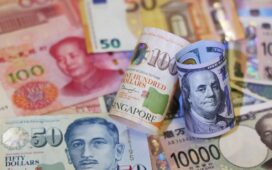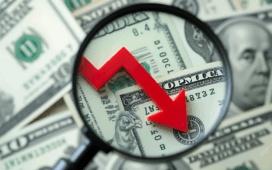(Bloomberg) — Asian currencies advanced amid broad weakness in the dollar and US assets as investors awaited further progress on trade deals. Crude oil slumped 3.6% after OPEC+ agreed to a further surge in output.
A gauge of regional currencies rose, with the Taiwan dollar surging as much as 5% in the biggest intraday gain in over three decades, and the Malaysian ringgit rising 1% to the highest since October. The dollar declined for a second day and US equity-index futures dropped 0.7%, after President Donald Trump said he had no plans to talk to his Chinese counterpart this week. Gold rallied as much 1%. There’s no cash trading in Treasuries in Asia as Japan is closed for a holiday, along with markets in Hong Kong and China.
A combination of repatriation buying and traders seeking alternative investments amid the “sell America” wave has helped Asian currencies strengthen recently. Financial markets have steadied in the past two weeks – the S&P 500 on Friday posted its longest winning streak in two decades – amid signs that talks with Asian nations are progressing and trade tensions between China and the US are thawing.
“Recent cyclical gains in equities don’t change the structural ‘Sell America’ theme,” said Charu Chanana, the chief investment strategist at Saxo Markets in Singapore. “Trade deal optimism is giving way to the reality of complex, slow-moving negotiations.”
After several days of rally built on hopes of trade deals and policy clarity, markets are now digesting the complexity of achieving comprehensive trade agreements, which suggest prolonged uncertainty impacting business decisions, she said.
Trump suggested that his administration could soon strike trade deals with some countries. The president also said in an interview Sunday on NBC that he’s willing to lower the tariff on Chinese imports to spur trade. He also signaled that his aides are having conversations with counterparts from China. Last week, the Asian nation said it’s evaluating talks with the US.
The currency strength in Asia has traders on watch for more signs of central bank intervention to protect their currencies from a further rapid appreciation. Speculators have turned the most bearish against the dollar since September.
“There is definitely a weakening momentum in the US exceptionalism trade,” said Rajat Agarwal, an Asia strategist at Societe Generale in Bengaluru, India. “The bias for the US dollar remains on the downside, which is a positive for EM equities and currencies,” he said.
The Taiwan dollar jumped to the strongest level in about three years on speculation exporters are rushing to convert their holdings of the greenback to the island’s currency. Last week, the Taiwanese central bank had intervened as the currency soared.
On Friday, Hong Kong stepped in for the first time since 2020 to defend its peg, buying a record amount of US dollars after the city’s currency rose to the upper end of its trading band. The Hong Kong dollar tested the strong end of its allowable trading band for a second session Monday.
Markets Live Strategist Garfield Reynold says:
The US dollar has been sliding both when tariff concerns intensify, and also when they ease. That shows President Trump’s policies are spurring traders to impose an extra risk premium for US assets, one that will ultimately undermine the rebound seen in equities.
The Australian dollar edged higher after Prime Minister Anthony Albanese won a strong mandate to tackle much-needed economic reform and bargain with the Trump administration on tariffs. The Singapore dollar strengthened after the ruling People’s Action Party also secured a convincing victory at the weekend’s election.
Meanwhile, the OPEC+ major production increase added to supply at a time when demand is challenged by the drag from the trade war. The alliance — led by Saudi Arabia and Russia — has been reversing prolonged output curbs that were meant to support prices, but which cost it market share to rival drillers.
“Risk has skewed rapidly to the downside,” Brian Leisen, a commodity strategist at RBC Capital Markets, wrote in a note to clients.
In corporate news, Shell Plc is working with advisers to evaluate a potential acquisition of BP Plc, though it’s waiting for further stock and oil price declines before deciding whether to pursue a bid, according to people familiar with the matter. Shell may also wait for BP to reach out or for another suitor to make a first move, and its current work may help get prepared for such a scenario, they said.
Warren Buffett, who built Berkshire Hathaway Inc. into a business valued at more than $1.16 trillion and himself into a celebrity billionaire renowned for his investing acumen and witticisms, will step down at year-end after six decades atop the conglomerate. Greg Abel, the vice chairman for non-insurance operations, will take charge of the conglomerate.
This week, US Treasury Secretary Scott Bessent is set to testify in Congress on fiscal and economy policy and the Bank of England and the Fed will give policy decisions.
“It will take a couple of months for enough hard data evidence to accumulate to make the case for a cut,” Goldman Sachs Group Inc. economists including Jan Hatzius and David Mericle, wrote in a note Sunday referring to the Fed. They are are forecasting three consecutive 25 basis point rate cuts in July, September, and October.
Some of the main moves in markets:
Stocks
- S&P 500 futures fell 0.7% as of 1:23 p.m. Tokyo time
- Australia’s S&P/ASX 200 fell 0.7%
- Euro Stoxx 50 futures fell 0.1%
Currencies
- The Bloomberg Dollar Spot Index fell 0.3%
- The euro rose 0.3% to $1.1335
- The Japanese yen rose 0.5% to 144.18 per dollar
- The offshore yuan rose 0.2% to 7.2004 per dollar
Cryptocurrencies
- Bitcoin fell 1.5% to $94,294.46
- Ether fell 2% to $1,799.63
Commodities
- West Texas Intermediate crude fell 4% to $55.97 a barrel
- Spot gold rose 0.6% to $3,259.16 an ounce
This story was produced with the assistance of Bloomberg Automation.
–With assistance from Abhishek Vishnoi, Chiranjivi Chakraborty and Joanna Ossinger.
©2025 Bloomberg L.P.





